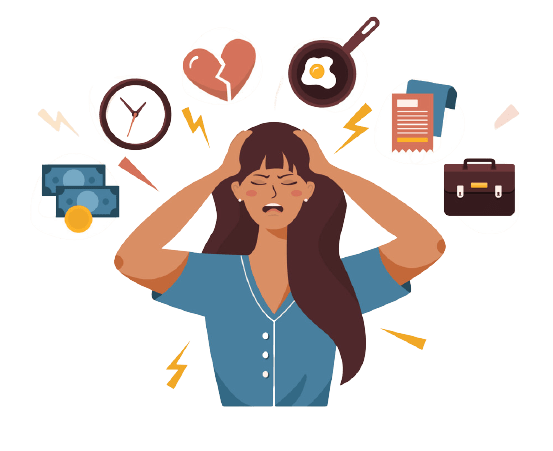Online Anger Management Counseling & Therapy | Top Therapists
- Set up a free & confidential chat on your anger issues
- Unlimited help through anger self-care app
- Live Video or Chat sessions with top Anger Therapists
Begin Therapy
Consult online with best Therapist
Get the Best Help for Anger Issues
TherapyMantra is here to help you on your path to recovery from irritability and anger issues. We match you with the best anger therapists available 24/7 via video call or messages.
Match with Anger Therapists
We assign the best counselors experienced in anger issues based on your needs.
Affordable and Effective
Our online sessions are 90% less expensive than in-person therapy, available 24/7.
Self-Care for Anger
We offer ongoing anger support through self-care tools, anger help videos, chat groups, meditations, breathing exercises, and other resources.

Wondering if it’s just a phase or something more? Take our Free online anger test to find out?
How it works?
You are matched with an Anger Counsellor based on your needs and preferences. You get a secure “therapy room” where you can communicate with your counselor via chat or phone. You can write or talk about anger & ask questions to deal with anger.

Register for Anger Counseling
Simply complete a 5-minute online form to tell us about your anger issues

Speak to an Anger Counselor
Get professional help for anger by top counselors, available 24/7 based on your preferences and needs.

Connect to Our App
Apart from Video/chat sessions, our app offers self-care tools, videos, and meditations to help you deal with your anger.
Top Therapists For Anger Management
Positive conversations, exercises, and meditations are used by TherapyMantra psychologists to help you deal with anger. Our Therapists outperform traditional counseling as you get matched from a pool of 500+ counselors for anger issues, who offer 24/7 unrestricted private chat.
What is Anger?
Anger is the most common of all emotions, with its roots in our brain. At times, anger can overwhelm us and lead to irreversible consequences on interpersonal relationships. This is one of the things that makes anger different from other emotions, especially when it becomes chronic.
Anger can be recognized by some physical symptoms such as a reddish face, pounding heart, or headache. It is linked to stress and health problems like high blood pressure or coronary diseases.
When someone becomes angry, there is an instinctive tendency to engage in aggressive behavior. However, this reaction could be prevented by applying immediate cognitive techniques. Moreover, there are many different ways to deal with anger. It is important to find the one that works for you and to use it every time you feel yourself getting angry.
“Read helpful tips on anger management, self-care, and therapy in our blogs on Anger issues and management.”
Types of Anger
Anger can be classified into several types.
Habitual Anger
This type of anger is usually caused by circumstances that have been repeated in the past. This might be something that someone has said or done to you in the past and it continues to bother you even now. It might also be an event that you have no control over.
Situational Anger
This type of anger is usually caused by something which is happening in the present moment. It might be something that someone has said or done to you which has resulted in an immediate reaction.
Constructive Anger
This type of anger is usually caused by a situation where you feel that you need to take some form of action. It might be that someone has wronged you and you need to take steps to deal with the situation. This type of anger can often lead to positive outcomes.
Instrumental Anger
This type of anger is usually caused by something which the individual might have the power to change. It is justified anger. It is anger that is used as a tool to achieve a goal. This type of anger is usually caused by something which the individual might have the power to change. It is justified anger. It is anger that is used as a tool to achieve a goal.
Treatment Options for Anger
Anger and aggression can be treated with anger management techniques. There are many methods to learn how to control your anger, such as better stress management, deep breathing exercises, meditation, and relaxation techniques. These simple techniques might help you reduce the frequency and intensity of angry outbursts or aggressive behavior.
Stress Management Techniques
There are several simple steps you can take to manage anger and stress. Keep a journal that tracks what’s going on right before your feelings of anger or aggression arise. This may help you identify triggers for feeling angry. Learn how to relax — such as through meditation, yoga, massage, or deep breathing exercises. Learn how to manage your time more effectively. Getting enough sleep. Eating healthy meals and exercising regularly.
Deep Breathing Exercises
Deep breathing exercises are a simple way to quickly relax your body, slow your heart rate, and improve your mood. Whenever you find yourself taken over by an outburst of anger, simply breathe in and breathe out. Repeat it a few more times.
Meditation
Meditation is a way to focus your mind and calm your thoughts. It can be done in a variety of ways, including sitting with your eyes closed, focusing on your breath, or repeating a mantra (a word or phrase that you focus on).
Medications
Medications can also be prescribed to help people who have problems with anger and aggression. Antidepressants, mood stabilizers, and anti-anxiety medications might be prescribed if it is determined that another mental health condition is present as well.
How can therapy help with Anger?
Therapy can help individuals learn how to cope with their anger healthily. This may involve learning about the different types of anger, and the emotions that are typically associated with it. Learning examples of how anger may be helpful, and when it can lead to negative consequences can help an individual with their anger.
Therapy will also teach individuals about the connection between thoughts, feelings, physical sensations, and behavior. This means that changing their thinking can lead to changes in behavior or physical responses. Therefore if someone thinks that they are worthless every time they become angry, therapy can help them to reframe this thought so that they do not act out their anger.
Therapists may also provide coping mechanisms for dealing with stressful situations. If anger is frequently expressed in an uncontrolled or destructive manner, therapy can help to teach individuals how to communicate their feelings constructively.
Therapy options for Anger
Several different therapies can be helpful for anger management.
Cognitive Behavioural Therapy (CBT for Anger)
CBT focuses on identifying and challenging unhelpful thoughts and beliefs that may be contributing to anger. The therapist will help you to develop coping strategies to deal with your anger more effectively. Explore our cognitive behavioural therapy options.
Behavioural Therapy
This type of therapy focuses on changing the behaviors that contribute to anger, such as aggressive or violent behavior. It can help to teach new skills for dealing with difficult situations and managing anger.
Interpersonal Therapy (IPT)
This therapy helps you to deal with difficult relationships that are contributing to anger. By improving communication and problem-solving skills, IPT may help you learn how to resolve conflicts in your close relationships.
Dialectical Behavior Therapy (DBT)
DBT is a type of therapy that focuses on balancing the need for change with acceptance. It can be helpful for people who have difficulty managing their anger, as well as other intense emotions. Get affordable DBT therapy at TherapyMantra.
Acceptance and Commitment Therapy (ACT)
ACT is a type of therapy that aims to teach skills for living with acceptance and “mindfulness” to manage intense emotions.
How to find an Anger Therapist?
At TherapyMantra, you can easily find a qualified anger therapist near you. With a network of 500+ licensed therapists listed in our therapist directory, we make it simple to connect with the right expert for your needs. Here are a few ways to get started:
Ask your doctor or mental health professional for a referral to an experienced anger management therapist.
Talk to trusted friends or family members who may have had positive experiences with therapy.
Search online using trusted directories like TherapyMantra, where you can find verified professionals who specialize in anger issues, emotional regulation, and stress management.
Whether you’re dealing with frequent outbursts, irritability, or struggling with emotional control, our platform helps you find the right support through online anger counseling—all from the comfort of your home.
10,000+ Happy & Healed Anger patients

“Therapy has helped me learn how to deal with my anger more constructively. I now understand how to better deal with stressful situations and how to communicate better with my family.”
Kevin,
1 year on TherapyMantra
FAQs
Anger counseling is a form of talk therapy that helps individuals manage uncontrollable anger, emotional outbursts, and frustration. At TherapyMantra, trained therapists guide you through anger control techniques and coping strategies to improve emotional regulation.
Yes! TherapyMantra offers online anger counseling sessions, allowing you to speak with licensed therapists from the comfort of your home. It’s a convenient and private way to work on managing your anger.
If you often feel irritable, lose your temper easily, or struggle to control your anger in relationships or at work, anger therapy might help. Our platform connects you with the best anger therapists online who can support you.
TherapyMantra’s therapist directory features over 500+ professionals. You can search by location, specialty, and availability to find the right anger therapist near you or opt for virtual sessions.
Common techniques include cognitive-behavioral therapy (CBT), mindfulness practices, stress management, and communication skills. Our therapists personalize your sessions to focus on anger control techniques that suit your needs








